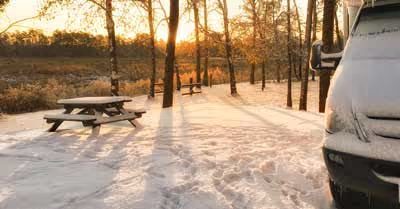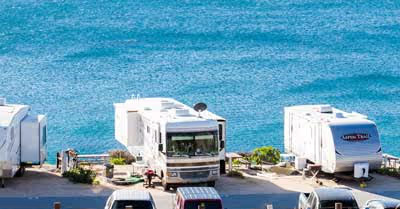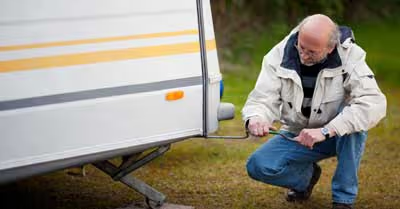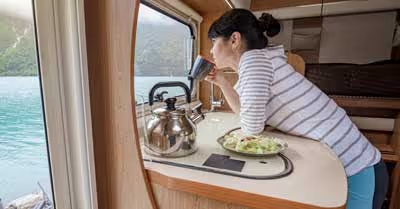Table of Contents
How Should I Store My RV and Why It Needs to Be Leveled?
Parking your RV on the right spot isn't always a simple and straightforward thing to do, as there is a lot of factors that you will need to consider. Nowadays, most of the driveways that are available are slope, and it's hard to find the one that is flat. The perfect way for you to store your RV depends on the weight distribution and whether or not you can afford to buy some wheel blocks, but first, let's talk about the weight distribution.
If you plan to store your RV at a certain angle, then you should know that the items can start to shift slowly towards the lower level while weight may redistribute to other parts of your RV. These movements may cause damages to the interior and exterior components and the axles of your RV. Hence, it's highly recommended for you to find a place that is completely level. You can buy a bubble level and use it to determine the level of a particular place that you plan to store your RV in.
After that, to add a slight extra layer of safety to your RV, it's highly recommended for you to buy some wheel blocks which you can use to prevent your RV from slowly shifting to the lower end. You might want to invest in these wheel blocks because you might make some mistakes when determining the level of the place that you plan to park your RV on. Just in case the spot that you picked is not level enough, these wheel blocks may help you save your RV from further shifting towards destruction.
Next, you should also ensure that your RV is leveled properly to minimize the amount of stress on the structure and frames of your RV. Some of the areas that will be negatively affected if your RV is not leveled are the cupboards, plumbing, chassis, and door frames. Every RV has been designed to be leveled, so you might risk causing some long-term damage and issues if it is not leveled properly. By ensuring your RV is level, you will be able to make sure that your cupboards and doors function properly.
Should I Store My RV at Home?
Yes, here's why. Most of your vehicle storage facilities that are available in your local area have been designed to store multiple types of RVs, so while they are the perfect place to store your RV, they might not be the cheapest option that you have. Your home, on the other hand, might not be the best place to store your RV, but it gets the job done. Besides, why would anyone want to pay more for something they could do themselves?
If you still think that it's better to store your RV in a storage facility, then let's take a look at the total costs of storing your RV, as this is one of the driving factors that would influence the final decision of many RV owners. If you plan to store your RV somewhere in the storage facility or parks, you will definitely need to spend more money.
Just in case you choose to store your RV in an outdoor facility, you will most probably end up paying somewhere between $30 to $100 per month. To make it simple, the bigger the size of your RV, the more expensive the costs of storing it in a facility would be. Keep in mind that this price range is for the outdoor facility.
As for the indoor facility, this is going to be more expensive. Any indoor storage facility that is not heated will most probably charge you around $50 to $125 per month. If you need the interior facility to be heated, then you should expect to pay anywhere between $100 to $500 per month. Another thing that you should consider is the long-term care of your RV. Not everyone has the money to consistently pay the storage facility these kinds of money every month, so you might want to store your RV in your home instead.
What Do I Have to Check Before I Store My RV?
One of the things that you need to check before storing your RV is the amount of room that is available somewhere around your house that can be used as a designated space to store your RV. There are some guidelines here that you may use to make an initial smart guess. If you own a Class A motorhome and you live in a single-story, then you might not have enough space to store your RV. However, please be reminded that this is just an estimation.
On the other hand, if you own a Class B or C motorhome, then chances are, you might have enough space to store your RV. Here are some numbers that you may use to estimate the availability of space that you might have around your house. A typical Class C RV would have measured between 21 to 35 feet in length, while a standard Class B RV would have a length between 16 to 22 feet. In a case where the length of your RV is more than 40 feet, unless you live in a mansion, you will have to find other places to store your RV.
Apart from that, you will also have to keep in mind to check the legalities of storing an RV at your house. Depending on which state you're from, storing an RV at your house might be illegal. For example, in a case where you have some kind of affiliation with the homeowner's association, this type of association would most likely prohibit you from storing your RV anywhere in your house area. It's highly recommended for you to make a couple of phone calls before you decide to park your RV anywhere on your property to avoid any issues.
Are There Any Other Factors to Keep in Mind?
All of the factors that will be provided should all be taken into great consideration when you decide how you will store your RV. One of these factors has always been the insects and bugs, as there is literally no place that is safe from these creatures. This is especially true if you decide to park your RV on the outside. However, if you choose to store your RV in a garage or an outdoor storage facility, then you should always take some precautionary measures.
One way to solve this is by making sure that you sealed off everything. Besides that, always remember to clean any traces of food from the coffee tables and countertops. This also includes any kinds of food packaging and wrappers that might have some residue left. If you don't take the trash out and remove all of the traces of food that you might have left on the surfaces mentioned earlier, these insects will surely sense it and will begin to move around inside your RV.
Bats, raccoons, rats, and mice will surely be more than happy to make your RV their home if you don't put in the effort to maintain the interior cleanliness of your RV. Rats and mice are highly destructive as they have some really sharp teeth that will surely destroy your upholstery and furniture, messing with your wiring by chewing the wires and cables, and wreck the hard surfaces available such as the wooden walls resulting in an absolute mess everywhere.
Apart from that, you should also consider installing some new security features to provide an additional layer of protection from burglars. The reason for this is that you don't know who is going to vandalize or even steal your RV, so it's very worth it to add some security not just in your RV but also around it. You might think that you live in a safe and friendly neighborhood, thus removing the need for an extra layer of security, but at the end of the day, it's always better to be safe than to risk having your RV damaged or stolen by someone else.
Recent Articles














